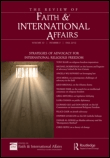
Review of Faith & International Affairs
Scope & Guideline
Advancing Understanding at the Intersection of Faith and International Relations
Introduction
Aims and Scopes
- Interfaith Relations and Diplomacy:
Examining how different religious traditions engage in dialogue, conflict resolution, and diplomacy, particularly in politically charged environments. - Religious Freedom and Human Rights:
Investigating the role of religion in promoting or hindering human rights, with a focus on freedom of religion or belief and its implications for societal well-being. - Religion and Development:
Analyzing the impact of faith-based organizations and religious communities on development initiatives, including education, health, and poverty alleviation. - Political Theology and Ethical Frameworks:
Exploring the theological underpinnings of political ideologies and ethical considerations in international relations, particularly through the lens of just war theory and humanitarian interventions. - Covenantal Pluralism:
Focusing on the concept of covenants as a means of fostering pluralism and coexistence among diverse religious communities, particularly in contexts of conflict.
Trending and Emerging
- Faith-Based Responses to Global Crises:
An increased focus on how religious communities and leaders respond to crises such as pandemics, conflicts, and humanitarian emergencies, emphasizing the practical roles of faith in modern governance. - Cross-Cultural Religious Literacy:
A growing interest in initiatives aimed at enhancing cross-cultural understanding and religious literacy, particularly in multicultural societies, as a means to promote peace and cooperation. - Religious Nationalism and Democracy:
Heightened attention to the interplay between religious nationalism and democratic governance, exploring the challenges posed by religious identity politics to global democratic norms. - Interreligious Dialogue and Peacebuilding:
Emerging discussions around the role of interreligious dialogue in conflict resolution and peacebuilding efforts, showcasing the potential of faith as a unifying force in divided societies. - Legal and Policy Frameworks for Religious Freedom:
An uptick in analyses concerning the legal and policy dimensions of religious freedom, reflecting the increasing importance of international standards and national implementations.
Declining or Waning
- Traditional Religious Authority:
There seems to be a decline in papers focusing on traditional religious authorities and institutions, possibly reflecting a broader trend towards examining grassroots movements and individual agency within faith communities. - Secularism and Religious Discourse:
The exploration of secularism as a counterpoint to religious discourse has diminished, suggesting a shift towards more integrated analyses of faith in public life rather than viewing religion solely in opposition to secular ideologies. - Historical Studies of Religion in Politics:
There is less focus on historical analyses of religion's role in politics, indicating a trend towards contemporary issues and immediate implications of faith in international contexts.
Similar Journals

INTERNASJONAL POLITIKK
Illuminating Contemporary Challenges in Global AffairsINTERNASJONAL POLITIKK is a prominent peer-reviewed journal published by the Norsk Utenrikspolitisk Institutt in Norway, focusing on the multifaceted domains of Political Science and International Relations. With an ISSN of 0020-577X and an E-ISSN of 1891-1757, this journal has transitioned to an Open Access format since 2016, facilitating broader access to vital research. It is noted for its critical analyses and explorations of contemporary international issues, aiming to bridge academic research and public policy debates. Given its ranking in the Q3 category for both Political Science and Sociology and Political Science, as reported in 2023, the journal has carved out a significant niche among scholars and practitioners alike. Researchers are encouraged to contribute their findings and insights as the journal continues to serve as a platform for thought-provoking discourse, especially in a rapidly changing global landscape.
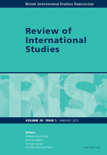
REVIEW OF INTERNATIONAL STUDIES
Advancing global discourse in political science.REVIEW OF INTERNATIONAL STUDIES, published by Cambridge University Press, is a leading journal in the fields of Political Science and International Relations, with a robust focus on sociopolitical dynamics from a global perspective. Established in 1976, it has garnered a distinguished reputation, achieving a Q1 ranking in both Political Science and Sociology for 2023, underscoring its impact and relevance within the scholarly community. With an impressive Scopus ranking placing it in the 93rd percentile among peer journals in its field, this journal serves as an essential platform for researchers, professionals, and students engaged in critical analysis and discourse on international affairs. Although it does not currently offer Open Access options, the journal is committed to advancing knowledge through rigorous peer-reviewed research, contributing significantly to the academic dialogue surrounding global political issues.
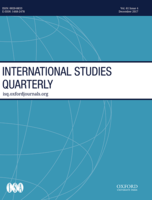
INTERNATIONAL STUDIES QUARTERLY
Fostering Insight into International SystemsINTERNATIONAL STUDIES QUARTERLY, published by OXFORD UNIVERSITY PRESS, is a premier scholarly journal in the domains of Political Science and International Relations. With an esteemed Q1 ranking in both fields as of 2023, this journal stands out as a significant contributor to the academic discourse on global issues, diplomacy, and the socio-political challenges facing international systems. Covering a spectrum of interdisciplinary research since its inception in 1978, it provides a vital platform for researchers, practitioners, and students alike to engage with contemporary theoretical frameworks and empirical studies. Although it operates under a traditional subscription model, its high visibility in the academic community ensures that it reaches a wide audience. With a Scopus ranking that positions it in the top percentile of its fields, INTERNATIONAL STUDIES QUARTERLY remains essential for anyone seeking to deepen their understanding of the complexities of international relations.
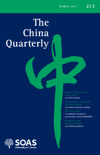
CHINA QUARTERLY
Fostering Insightful Discourse on China's Role in the WorldCHINA QUARTERLY, an esteemed journal published by Cambridge University Press, serves as a leading platform for scholarly discourse in the fields of Development, Geography, Planning and Development, and Political Science and International Relations. With a strong reputation evidenced by its Q1 ranking in multiple categories and indexed since 1960, it attracts a diverse array of research focusing on the socio-economic and political dynamics within China and its impact on global affairs. The journal's rigorous peer-review process ensures the publication of high-quality articles that contribute meaningfully to contemporary debates and theoretical advancements. Although not open access, CHINA QUARTERLY offers extensive research opportunities for scholars, professionals, and students keen on exploring and understanding the intricate layers of China’s development and its global relations. Its dedicated address in Cambridge, United Kingdom underscores its commitment to fostering international dialogue and academic collaboration.
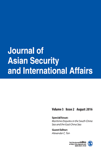
Journal of Asian Security and International Affairs
Unraveling the Complexities of Asian International Relations.Journal of Asian Security and International Affairs, published by SAGE Publications Inc., stands at the forefront of research in the realms of political science and international relations, particularly focusing on the dynamic security landscapes across Asia. With an ISSN of 2347-7970 and an E-ISSN of 2349-0039, this peer-reviewed journal has maintained a commendable position within the academic community, evidenced by its ranking in the Q1 category for Political Science and International Relations as of 2023. It currently holds a respectable Scopus rank of 295 out of 706, situating it in the 58th percentile, which underscores its contributions to the field. While the journal operates as a subscription model, it remains committed to disseminating high-quality research that enhances understanding of security issues in the Asian context, offering a valuable platform for researchers, professionals, and students alike. With coverage spanning from 2014 to 2024, the journal invites innovative scholarship that addresses emerging trends, challenges, and theories relevant to Asian security and international affairs.
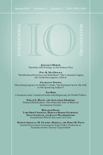
INTERNATIONAL ORGANIZATION
Navigating the Intersection of Politics, Law, and SocietyINTERNATIONAL ORGANIZATION, a prestigious journal published by Cambridge University Press, stands at the forefront of political science, law, organizational behavior, and sociology. Since its inception in 1947, this influential journal has fostered critical dialogue and research among scholars and practitioners, maintaining an impressive impact in the field, as evidenced by its Q1 rankings across multiple disciplines in 2023. With a robust Scopus rank placing it in the top percentiles of its categories, INTERNATIONAL ORGANIZATION serves as an essential resource for those engaged in understanding complex global issues, institutional frameworks, and human resource dynamics. Although it does not offer Open Access, it provides extensive insights that are invaluable for students, researchers, and professionals dedicated to advancing knowledge in international relations and organizational studies. For those looking to contribute to impactful scholarship, submissions to this journal provide a unique opportunity to influence the evolving landscape of these critical fields.
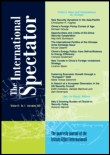
International Spectator
Exploring Global Dynamics in Political Science.International Spectator, published by Routledge Journals, Taylor & Francis Ltd, stands as an eminent peer-reviewed journal in the field of Political Science and International Relations. Established in 1983 and continuing its impactful discourse through 2024, the journal boasts a commendable Q1 ranking in 2023, confirming its position among the top-tier journals within its discipline. With a Scopus ranking of 121 out of 706, it lies in the 82nd percentile, showcasing the robustness of its scholarly contributions. Although not designated as an open-access journal, International Spectator remains essential reading for researchers, professionals, and students seeking to navigate the complexities of international politics. The journal aims to publish high-quality research that engages with global political dynamics, providing a platform for innovative ideas and critical analyses that shape the understanding of international relations today.
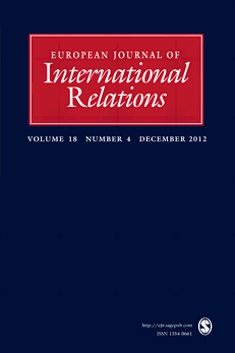
EUROPEAN JOURNAL OF INTERNATIONAL RELATIONS
Exploring the complexities of international relations.The EUROPEAN JOURNAL OF INTERNATIONAL RELATIONS (ISSN: 1354-0661, E-ISSN: 1460-3713), published by SAGE Publications Ltd, stands as a prestigious conduit for innovative scholarship in the fields of Political Science and International Relations. Launched in 1995, this esteemed journal has carved a significant niche within the academic community, achieving a remarkable Q1 ranking for both Political Science and Sociology in 2023, along with an impressive Scopus rank, placing it within the top 5% of its category. This journal is committed to advancing rigorous analysis and fostering critical discourse on global interrelations, offering researchers, professionals, and students a platform for high-quality empirical and theoretical studies. Although it does not provide open access, the journal’s curated selection of articles, reviews, and original research continues to make it a vital resource for understanding the complexities of international relations in a contemporary context. As it converges through the years up to 2024, EUROPEAN JOURNAL OF INTERNATIONAL RELATIONS remains an essential reference for those striving to contribute to or engage with critical knowledge in the evolving landscape of global politics.
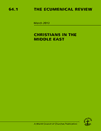
ECUMENICAL REVIEW
Bridging Disciplines in the Study of SpiritualityECUMENICAL REVIEW is a respected academic journal dedicated to the field of Religious Studies, published by WILEY. Since its inception in 1948 and continuing through 2024, this journal has played a crucial role in fostering interdisciplinary dialogue and scholarly research on various facets of religion and spirituality. With an ISSN of 0013-0796 and E-ISSN 1758-6623, ECUMENICAL REVIEW currently holds a Q3 ranking in the 2023 category of Religious Studies, reflecting its significant contribution to the field. The journal is ranked #337 out of 644 within its category on Scopus, placing it in the 47th percentile—indicative of its relevance and quality. Although it does not offer open access, the journal remains a valuable resource for researchers, professionals, and students alike who seek to engage with contemporary discussions on ecumenical issues. As it continues to explore the intersections of faith, culture, and social justice, ECUMENICAL REVIEW stands as an important platform for enriching the academic landscape of Religious Studies.
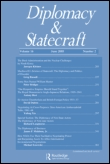
Diplomacy & Statecraft
Contributing to the legacy of diplomatic scholarship.Diplomacy & Statecraft, published by Taylor & Francis Inc, is a highly regarded journal in the realms of History, Political Science, and International Relations. Since its inception in 1990, this journal has played a pivotal role in the scholarly exploration of diplomatic practices and their implications for statecraft. With an ISSN of 0959-2296 and an E-ISSN of 1557-301X, it provides a rigorously peer-reviewed platform for academics and practitioners aiming to contribute to the understanding of global politics. Although not an Open Access journal, it maintains a commendable impact, evidenced by its Scopus rankings—positioned in the 69th percentile for History and engaging discussions on significant political themes. Its importance is underscored by its recent categorization in Q3 and Q4 quartiles, making it a critical resource for researchers and students interested in the complex dynamics of diplomacy and international relations. With a commitment to publishing compelling and insightful articles, Diplomacy & Statecraft continues to foster academic dialogue and enrich our understanding of the strategic maneuvers that shape our world.